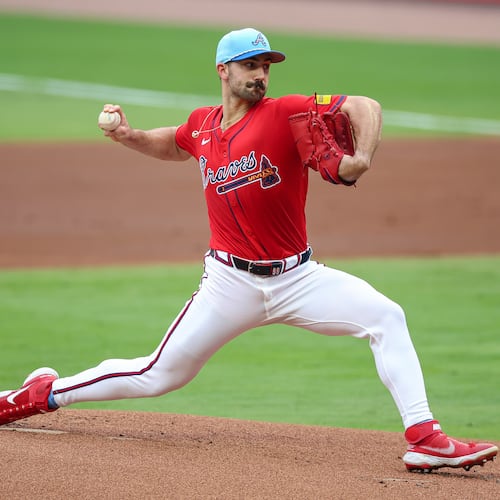This would have been hard to envision in July and August, when Ian Anderson was working out amid the obscurity of the Braves' alternate training site at Coolray Field in Gwinnett County.
But here he is, a rookie pitcher set to start for the Braves in the second game of a playoff series on the first day of October.
“I didn’t think it was going to quite work out in this fashion,” Anderson said Wednesday. “But all the work I was doing down there and everything that was happening down there was to prepare me for something like this, so I feel comfortable and confident going in."
Little more than a month ago, he was pitching every fifth day in controlled intra-squad games against other players, mostly prospects, at the Gwinnett camp. Thursday, after just six major-league starts, he will face the Cincinnati Reds in Game 2 of a best-of-three National League wild-card series at Truist Park.
“I feel prepared,” Anderson said. “All the work I’ve put in to get here, and throughout the season since I’ve been up here, has been kind of leading up to this moment.”
The 22-year-old right-hander was promoted to the big leagues for the first time Aug. 25, about halfway through a shortened 60-game schedule, as the Braves tried to piece together a starting rotation that had been decimated by injuries and ineffectiveness.
On a team where 14 different pitchers started games, Anderson held firmly to his spot once he got a chance. His final regular-season resume: 3-2 record, 1.95 ERA, .172 opponents' batting average, 41 strikeouts (14 walks) in 32-1/3 innings.
Braves manager Brian Snitker said Wednesday that Anderson “was very well prepared” for his first call-up to the majors.
“That was kind of the way I was treating being over at the alternate site," Anderson said, “just trying to get better and then prepare myself for a situation like this.”
Half of Anderson’s six regular-season starts were extraordinarily good. He held the New York Yankees to one run (on one hit) in six innings in his Aug. 26 debut, held Boston to two runs (on six hits) in six innings Sept. 1 and held Washington to no runs (on one hit) in seven innings Sept. 12. He had eight strikeouts against the Red Sox and nine against the Nationals.
In his other three starts, Anderson showed some of the inconsistency typical of rookies transitioning to the big leagues. He allowed two runs on two hits (and four walks) in three innings against Miami on Sept. 7, allowed three runs on four hits in 4-2/3 innings against the Mets on Sept. 19 and, in his final regular-season start last week, allowed three runs (none earned) on seven hits in 5-2/3 innings against Miami.
That brings him to the big stage of the postseason, albeit without fans in the stands.
“I haven’t experienced 40,000 fans yelling yet,” he said, “so this is more what I’m used to.”
Anderson has been a prized prospect since the Braves made him their first-round pick, the third overall pick, in the 2016 draft. He wasn’t realistically competing for a spot in this season’s rotation when spring training commenced in February or even when the team reconvened for summer camp in early July. But while it would have been far-fetched to project the series of events that made him the team’s No. 2 starter by September, the Braves thought even in February that Anderson likely would make his major-league debut at some point this season.
“I kind of felt like, if we’d had a normal season and he went to Triple-A, there was some point in time he was going to need to come up here and be a part of this,” Snitker said. “Absolutely.”
After the injuries to Mike Soroka and Cole Hamels, the demotions of Mike Foltynewicz and Sean Newcomb, the departure of Felix Hernandez, the struggles of Robbie Erlin and Tommy Milone and Touki Toussaint and others, Anderson emerged.
“You’ll see him in the dugout between innings, and being here hasn’t overcome him at all,” Snitker said. “The makeup and how he conducts himself and handles himself and slows the game down are the big things that impress me, as much as his stuff.”
About the Author
Keep Reading
The Latest
Featured


